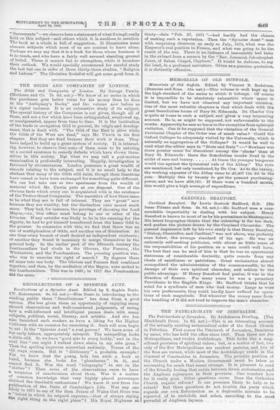THE GILDS AND COMPANIES OF LONDON.
The Gilds and Companies of London. By George Unwin. (Methuen and Co. 7s. ad. not.)—We know of no series in which the purchaser gets bettor value for his money than he does in the "Antiquary's Books," and the volume now before us is a signal instance. It is an exhaustive study of its subject. The special history of the Companies is not given, though all of them, and not a few which have been extinguished, swallowed up, or amalgamated, appear from time to timo. It is the institution of the trade or occupation Gild in general, its origin and develop- ment, that is dealt with. "The Gild of the East is alive while the Gilds of the West are dead," says Mr. Unwin in his first chapter, But they are dead because their work is done. They have helped to build up a groat system of society. It is interest- ing, however, to observe that some of them seem to be entering on a second existence to remedy defects which have shown them- selves in this society. But what we may call a post-mortem examination is profoundly interesting. Happily, investigation is favoured by circumstances. London possesses a great wealth of records relating to the subject, and it is no small help to the student that many of the Gilds still exist, though their functions have ceased or have been exchanged for something quite different. We can but take one or two specimens from the wealth of material which Mr. Unwin puts at our disposal. One of the obvious facts which every one is acquainted with is the existence of the Twelve Great Companies. The narrative of how these came to be what they are is full of interest. They are "great" now because they are wealthy, but the distinction once meant much more. They had, for instance, the privilege of choosing the Lord Mayor,—i.e., this officer must belong to one or other of the Liveries. If any outsider was likely to be in the running for the dignity, he had to get himself transferred from the lesser Gild to the greater. In connexion with this, we find that there was an era of multiplication of Gilds, and another era of diminution. At one time every branch of craft desired an independent existence ; at another they found it necessary to merge themselves in the general body. In the earlier part of the fifteenth century the teathersellere had rivals in the Glovers, the Pursers, the Whittawers, and the Powshmakers. The pressing question was : who was to exercise the right of search P By degrees these all came into one body. The Glovers and Pursers first combined together, and then, by the mediation of the Mayor, were united to the Leathersellers, This was in 1498; in 1517 the Pouchmakers did the same.






















































 Previous page
Previous page